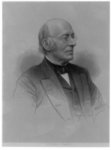As history has repeatedly shown, there is nothing that can conquer an individual with a persistent dream. No adversity is too strong and no action is too radical when one wishes to get one’s point across and make a difference in the world. This is very much the case for William Lloyd Garrison, the white abolitionist with strong passionate ideas about the structure and leadership of our country, especially in regards to slavery.
William Lloyd Garrison started expressing his love for writing his opinions at an extremely young age. His dreams of publishing his works led him to move to Boston, Massachusetts in 1829 at the age of twenty-four to become an editor for National Philanthropist. Although the newspaper over time proved to be unsuccessful, it gave him the opportunity to network with people that had seemingly similar ideals to his own. He became associated with the American Colonization Society, but that bridge was burned on July 4, 1829, when he gave his famous speech at Park Street Church.1
In that speech, Garrison openly criticized America, its ideas, and even the constitution. He states, “I say that our politics are rotten to the core. We boast of our freedom, who go shackled to the polls, year after year, by tens and hundreds and thousands! We talk of free agency, who are the veriest machines–the merest automata–in the hands of unprincipled jugglers!”2 He goes on to refer to the United States as “evil,” but more than anything, he seems to be the most concerned with the idea of slavery. This served as his opening speech as a leader in the abolitionist movement. The American Colonization Society quickly objected to the ill words used to describe the United States, and it was at that moment that he placed his own morals above the acceptance of any group.3 He disassociated himself from the American Colonization Society and decided to take on the fight on his own.
Garrison’s first step in expressing his ideas was starting a newspaper called The Liberator.4 This revolutionary newspaper debuted in 1831, and caused both praise and outrage from American citizens and officials alike for the next quarter century. His writings were known to be free and controversial, but like all other controversial topics, he had a large crowd of supporters. Once he knew he had plenty of attention, his actions began to correspond with his articles. He would say or do anything for the antislavery movement.
In 1854, he performed what many believe to be his most radical and passionate address of all time. During a July 4 speech, he set a copy of the constitution on fire and referred to it as “an agreement with hell.” He led the rest of the speech with the motto “No Union with Slaveholders.” This loud, expressive statement sparked a reaction even from people who did not even know of his event or cause.5 It did not take long for the news to spread. Newspapers were flooded with articles and political cartoons that displayed utter shock and confusion. A lot of the attention regarding this incident may have been negative, but it raised questions, such as “What’s going on here?” and “Who is he, and why his fury?” It made people listen and try to understand his cause even if they did not intend to do so. This brought so much attention to his cause and many people followed in his footsteps with their support.6
William Lloyd Garrison may have been a controversial figure, but he spoke in such a way that he was heard by all. He demonstrated that you didn’t have to be African American to be passionate about equal rights and he encouraged other white people to follow his example.
- Ronald Osborn, “William Lloyd Garrison and the United States Constitution: The Political Evolution of an American Radical,” Journal of Law and Religion 24 (December 2008): 82-85. ↵
- William Lloyd Garrison, “The Dangers of Slavery,” (address, Park Street Church, Boston, July 4, 1829). ↵
- Ronald Osborn, “William Lloyd Garrison and the United States Constitution: The Political Evolution of an American Radical,” Journal of Law and Religion 24 (December 2008): 82-85. ↵
- Ronald Osborn, “William Lloyd Garrison and the United States Constitution: The Political Evolution of an American Radical,” Journal of Law and Religion 24 (December 2008): 82-85. ↵
- Humanities, January 2013, s.v. “The Agitator William Lloyd Garrison and the Abolitionists,” by James Williford. ↵
- Fisher Banks, “What’s Going on Here?” Saturday Evening Post, 3 July 1954, 91. ↵



22 comments
Iris Henderson
Bravo!! This was such an excellent article! William Lloyd Garrison was certainly a fore to be reckoned with in terms of standing up for what is right and bringing attention to injustice. I love the fact that he burned the constitution in order to create controversy. Controversy brings attention to matters and creates a dialogue amongst people that normally wouldn’t be so open about their opinions.
Alexandra Lopez
I had only heard of Garrison a handful amount of times. With that being said, I didn’t really know too much information about him or what he contributed to mankind. This article does an extremely great job at informing those who didn’t know too much about the man. Reading how he set the constitution on fire just to get his message across is truly phenomenal. I love reading about the bravery of certain well-known figures taking a stand for what they believe in. It’s amazing how events like that still arise in today’s society. Celebrities taking a stand for what they believe in and using their voice and their fanbase to get their point across. Truly inspirational.
Constancia Tijerina
Before reading this article, I have never heard of Willam Lloyd Garrison, but what he has accomplished has definitely put a mark into this country and helped succeed it into moving forward in some way. What I find most remarkable is how brave he must be to burn the constitution in front of a crowd of people and dare say how “evil” the nation was. I find him to be a true icon and you were right to say that color does not matter when you try to move forward in the right direction and bring justice to what is right.
Hanadi Sonouper
This is the first time that I have heard of William Lloyd Garrison, and I am glad I had the pleasure of reading a great article. Previous to this, I was not aware of his story, but he is truly a heroic man for standing up for human and equal rights despite any racial or ethnic standard. What he believed in during this particular time period was unheard of, it is possible that more men and women felt the same, but did not have the courage to stand up for what is right. Since Mr. Garrison was a writer, it gave him an even greater platform for more individuals to read about this terrible time in history, he used his voice to get the message of the civil rights protest to many, and much like to day, the same approach continues.
Erin Vento
I had actually heard of the Liberator before, but not too much about William Lloyd Garrison. At the time, there were obviously not a lot of white people in America that would have the courage to speak out about slavery- or even feel that way-, leave an organization for it, and call America evil for it, so it’s nice to hear about it.
Andrew Dominguez
Ive never heard of William Garrison before this article. It is very interesting to see a white man express his feelings about slavery in a time, which slavery was the way. In my opinion he was successful because he was very controversial, and people were interested in this. What I’m surprised is that he was able to burn the constitution and still be alive. His bravery for doing this had an influence on the abolitionist movement.
Carlos Vazquez
The issue of slavery can be connected to many issues in this country. Before the civil war speaking out on slavery was seen as problematic and controversial. Even the founding fathers, who knew slavery was an issue, refused to mention it in the constitution, knowing it could create trouble all over the country. William Lloyd Garrison’s fight for abolition was groundbreaking and brave. Thanks to people like him, the north was able to acknowledge the problem of slavery and eventually launched the civil war.
Austin Pena
Great read. Before your article I never heard of William Garrison, or what he stood for. I think this was an important article, especially how it relates to the abolition movement. It was interesting to learn what he did and the way he went about it. Burning the constitution on July 4th and showing his distaste for the government and what it stood for seemed controversial even if that was to occur today, but it did what i would assume he wished for it to do and that was get people talking on the issue.
Caroline Bush
Great article! I had never heard about William Lloyd Garrison until reading this article and honestly that’s a shame. This man set the constitution on fire in order to get his message across, that act is something incredibly brave and unbelievable. After reading this article I want to look up more about Garrison and learn more about his life. Overall I did enjoy this article and glad that I got to learn about a new historical figure.
Christopher Martinez
I’ve heard a couple of times of William Lloyd Garrison and knew he was an abolitionist but never knew more then that. This article brings light to the idea of some if the first civil rights protests. Lloyd prove that even though you may not be the same skin tone, we are all still human and are all equal. This reminds me of times today and how celebrities use their platform to voice social issues currently happening in the world as they are looked up to already and have media on them daily. Garrison used his attention through his liberator papers and such to help voice his view on the early years of the abolition movement and bring light to the ever dying issue of racism.